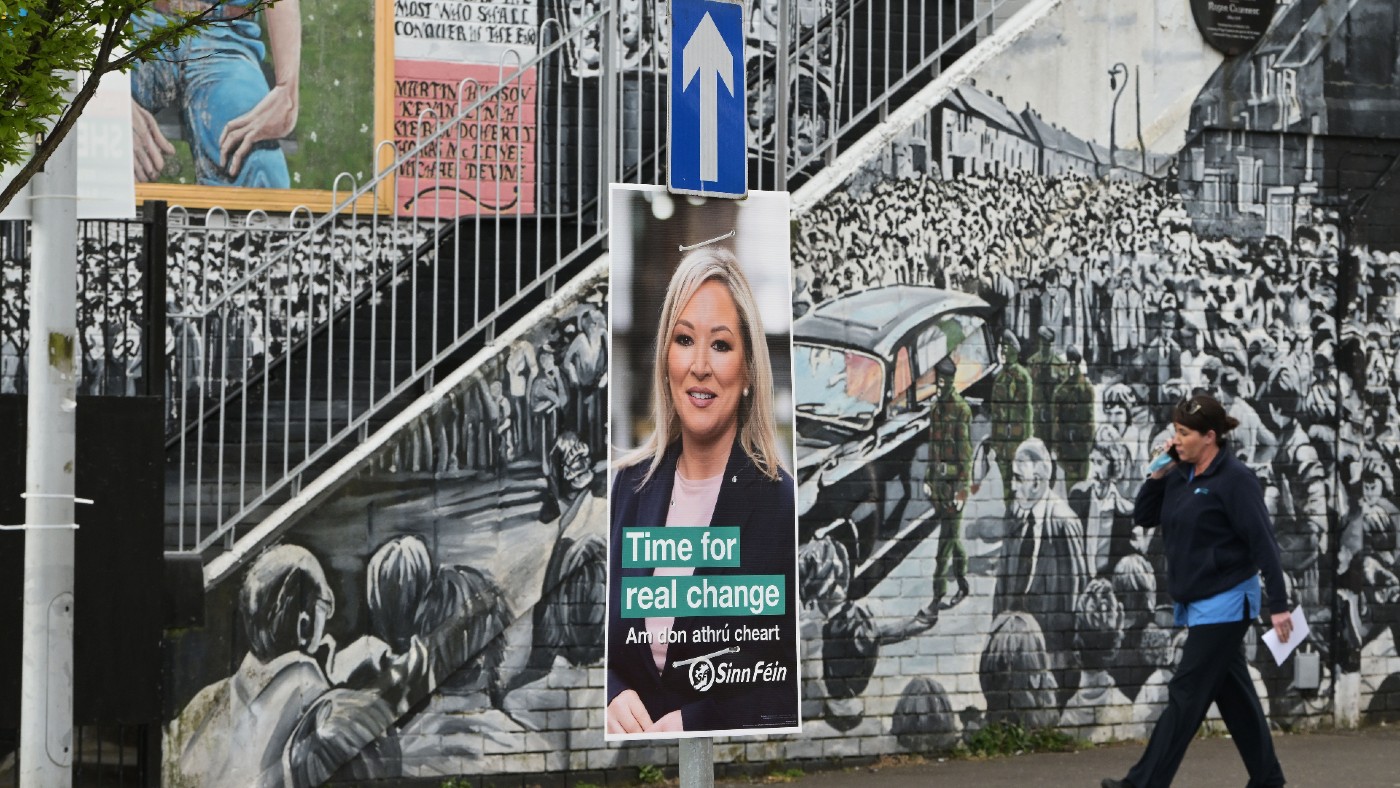Northern Ireland election: is Sinn Fein poised for victory?
The current poll average puts its support at 24%, against the Democratic Unionist Party’s 19%

A free daily email with the biggest news stories of the day – and the best features from TheWeek.com
You are now subscribed
Your newsletter sign-up was successful
There are elections across the UK next week, said The Guardian. Much attention has been devoted to their potential impact on Boris Johnson’s leadership, but the most profound consequences of the 5 May ballots may actually be felt in Northern Ireland. All 90 members of the Stormont Assembly will be elected by proportional representation, and there’s a good chance that Sinn Féin will emerge with the largest number of seats.
The current poll average puts its support at 24%, against the Democratic Unionist Party’s 19%. This would give the party the right to nominate its deputy leader, Michelle O’Neill, as the new first minister. In practical terms, it needn’t lead to a huge change. Under the power-sharing arrangement, the two largest parties must govern together, or not at all. But it would represent “a historic moment” for Northern Ireland, which has been led by unionists for more than a century.
This could be the most significant Stormont election in decades, said Ailbhe Rea in the New Statesman. There is now a “realistic prospect” that Ireland could have a Sinn Féin first minister in the north as well as a Sinn Féin taoiseach in the south, raising the chance of a referendum on unification. Yet such a poll won’t happen any time soon. Sinn Féin has built its support in the north by putting the Irish unity issue “on the back-burner” and concentrating instead on voters’ everyday concerns, such as healthcare and the cost of living.
The Week
Escape your echo chamber. Get the facts behind the news, plus analysis from multiple perspectives.

Sign up for The Week's Free Newsletters
From our morning news briefing to a weekly Good News Newsletter, get the best of The Week delivered directly to your inbox.
From our morning news briefing to a weekly Good News Newsletter, get the best of The Week delivered directly to your inbox.
Northern Ireland’s politicians will struggle to deliver on any of their election pledges in the current political climate, said Jude Webber in the Financial Times. The DUP pulled out of the Stormont executive back in February in a row over the post-Brexit trading arrangements known as the Northern Ireland Protocol. And it has refused to commit to nominating a deputy first minister if Sinn Féin comes first in next week’s elections, which could render the assembly unable to function. Months of “political paralysis” likely await.
To make matters worse, Downing Street has chosen this of all moments to suggest that it may introduce legislation granting the UK the power to unilaterally override key elements of the Northern Ireland Protocol, said Bobby McDonagh in The Irish Times. The move is “presumably designed to boost the chances of the DUP” in the elections, but it’s fundamentally unhelpful. Such a step would only “further unsettle the delicate situation in Northern Ireland by moving the real and unavoidable challenges of dealing with the consequences of Brexit back to square one”.
A free daily email with the biggest news stories of the day – and the best features from TheWeek.com
-
 The ‘ravenous’ demand for Cornish minerals
The ‘ravenous’ demand for Cornish mineralsUnder the Radar Growing need for critical minerals to power tech has intensified ‘appetite’ for lithium, which could be a ‘huge boon’ for local economy
-
 Why are election experts taking Trump’s midterm threats seriously?
Why are election experts taking Trump’s midterm threats seriously?IN THE SPOTLIGHT As the president muses about polling place deployments and a centralized electoral system aimed at one-party control, lawmakers are taking this administration at its word
-
 ‘Restaurateurs have become millionaires’
‘Restaurateurs have become millionaires’Instant Opinion Opinion, comment and editorials of the day
-
 How corrupt is the UK?
How corrupt is the UK?The Explainer Decline in standards ‘risks becoming a defining feature of our political culture’ as Britain falls to lowest ever score on global index
-
 Democrats push for ICE accountability
Democrats push for ICE accountabilityFeature U.S. citizens shot and violently detained by immigration agents testify at Capitol Hill hearing
-
 Fulton County: A dress rehearsal for election theft?
Fulton County: A dress rehearsal for election theft?Feature Director of National Intelligence Tulsi Gabbard is Trump's de facto ‘voter fraud’ czar
-
 ‘Melania’: A film about nothing
‘Melania’: A film about nothingFeature Not telling all
-
 Greenland: The lasting damage of Trump’s tantrum
Greenland: The lasting damage of Trump’s tantrumFeature His desire for Greenland has seemingly faded away
-
 Minneapolis: The power of a boy’s photo
Minneapolis: The power of a boy’s photoFeature An image of Liam Conejo Ramos being detained lit up social media
-
 The price of forgiveness
The price of forgivenessFeature Trump’s unprecedented use of pardons has turned clemency into a big business.
-
 The ‘mad king’: has Trump finally lost it?
The ‘mad king’: has Trump finally lost it?Talking Point Rambling speeches, wind turbine obsession, and an ‘unhinged’ letter to Norway’s prime minister have caused concern whether the rest of his term is ‘sustainable’